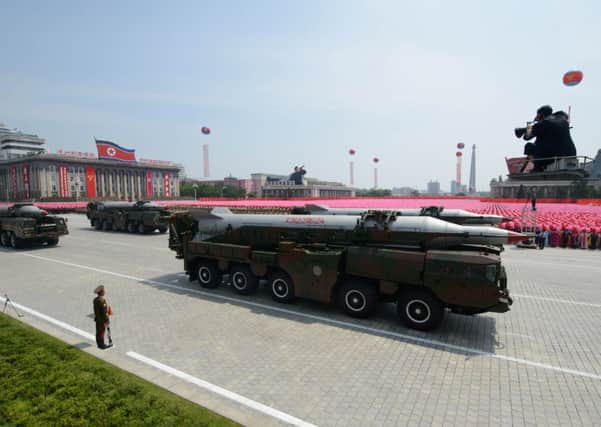China ‘to press N Korea to quit nuclear programme’


He told reporters in Beijing he was pleased China “could not have more forcefully reiterated its commitment” to the goal of denuclearising North Korea.
The reclusive Asian state has defied international warnings not to build atomic bombs and long-range missiles.
Advertisement
Hide AdAdvertisement
Hide AdNorth Korea is believed to have enough fissile material to build up to ten nuclear bombs, but most intelligence analysts say the country has yet to master the technology to deploy such weapons.
Mr Kerry said: “I encouraged the Chinese to use every tool at their disposal, all of the means of persuasion they have, building on the depths of their long cultural and common history with North Korea. They made it very clear that if the North doesn’t comply and come to the table and be serious about talks and stop its programme … they are prepared to take additional steps in order to make sure their policy is implemented.”
He said the US and China were now discussing “the specifics of how you do that”.
Chinese foreign minister Wang Yi said his country would work with all parties concerned, including the US, to play a constructive role for the region’s peace and stability. “China will never allow chaos or war on the Korean Peninsula,” he said.
The subject of North Korea was raised during Mr Kerry’s meeting with Chinese president Xi Jinping, the foreign ministry said, with Mr Xi “setting forth China’s stance”.
The East and South China Seas also featured prominently on Mr Kerry’s agenda, with him calling for a “more rule-of-law based, less confrontational regime”.
The US is uneasy about what it sees as China’s attempt to gain creeping control over waters in the Asia-Pacific region, including its declaration last November of an air defence identification zone in part of the East China Sea that includes islands at the centre of a dispute with Japan.
China says it has about 90 per cent of the South China Sea. But Brunei, Malaysia, the Philippines, Vietnam and Taiwan all have claims over parts of it.
Advertisement
Hide AdAdvertisement
Hide AdChina and the Association of South East Asian Nations have been discussing a code of conduct for the South China Sea, and Mr Kerry said he believed China was ready to achieve that goal. “That would help reduce tensions that stem from the territorial and maritime disputes and, in the meantime, it’s very important that everybody build crisis management tools and refrain from coercive or unilateral measures to assert whatever claims any country in the region may have,” he said.
Mr Wang said China was committed to a peaceful resolution for both the East and South China Seas disputes, but urged the US not to take sides.
He said it should “respect historical facts and China’s sovereign interests, adhere to an objective and impartial stance and take tangible actions to promote mutual trust in the region so as to safeguard regional peace and stability”.
Mr Kerry said he had told China it would be a bad idea to establish an air defence identification zone in the South China Sea, similar to the one it set up over the East China Sea.
“We have made it very clear that a unilateral, unannounced, unprocessed initiative like that can be very challenging to certain people in the region, and therefore to regional stability,” he said.